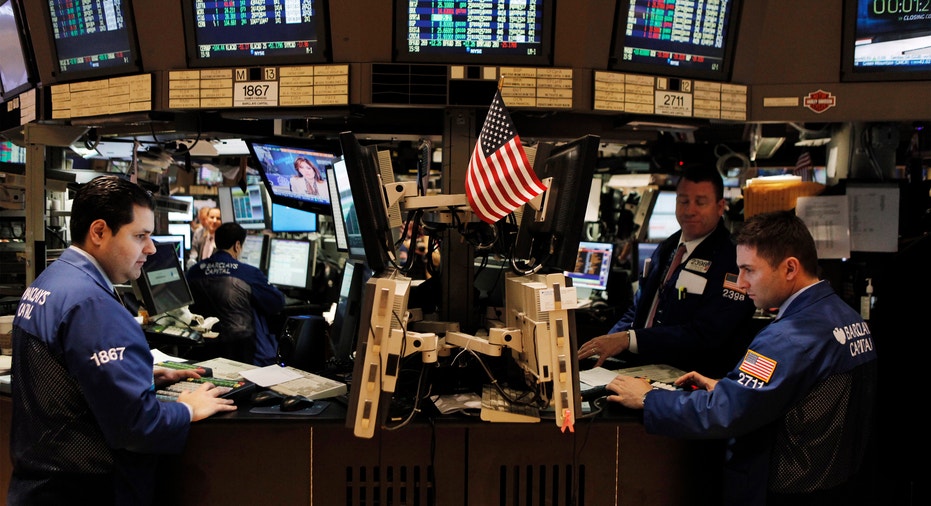Stocks Slip, Along With Oil Prices

U.S. stocks slipped Thursday as oil prices fell and investors sold safe haven assets they had accumulated after the U.K.'s decision to leave the European Union.
Investors shed assets that are often perceived as less-risky, such as high-dividend stocks and precious metals. But at midday, a decline in the price of oil led markets lower.
The Dow Jones Industrial Average dropped 23 points, or 0.1%, to 17896 and the S&P 500 dropped 0.1%. The tech-heavy Nasdaq Composite rose 0.4%.
U.S.-traded crude oil for August delivery fell 4.8% to $45.14 a barrel as data showed inventories fell less than expected and investors worried that global demand was softening. Stocks traded slightly higher Thursday morning before switching direction around noon, after the oil inventory numbers were released.
"Crude oil took everything lower," said Ilya Feygin, managing director at brokerage firm WallachBeth. "People were expecting oil inventory to be better than it was," adding that oil inventories have remained high despite a spike in gasoline demand during the summer driving season.
Energy companies in the S&P 500 fell 1.1%, making the group one of the worst-performing sectors in the index.
Stocks that pay high dividends in the utilities and telecommunications sectors of the S&P 500 also fell as investors shed assets they bought to protect themselves in the aftermath of the U.K.'s vote to leave the EU.
The yield on the benchmark 10-year Treasury note rose to 1.387%, up for the second day after closing at a record low on Tuesday.
"Those were areas that were very overbought," Mr. Feygin said.
In general, Mr. Feygin said trading volumes for the day were lighter than usual as some traders and investors are waiting for the highly anticipated June jobs report set for Friday before making big moves.
"This is an environment that will be driven by macro factors," said David Jilek, chief investment strategist at Gateway Investment Advisers. "Any bit of news or new data can cause a market reversal."
Last month's jobs report showed the fewest jobs gains in nearly six years. The June report could either suggest last month's weak jobs number was an anomaly, or confirm a pattern of employment growth losing momentum, said Mark Luschini, chief investment strategist at Janney Montgomery Scott.
On Thursday, the Labor Department said the number of Americans who filed for jobless benefits for the first time fell last week, suggesting the job market could be rebounding. Claims were a seasonally adjusted 254,000, below the 267,000 economists surveyed by The Wall Street Journal were expecting.
Some analysts said this stronger-than-anticipated reading could bode well for Friday's jobs report.
Even modest job gains would reassure investors "that we're not going toward recession," said Randy Warren, chief investment officer at Warren Financial Service.
Still, even if Friday's jobs report is strong, it doesn't necessarily mean there will be a rate raise anytime soon, some analysts said, adding that the Fed remains concerned about global conditions.
Minutes from the Federal Reserve's June meeting showed Wednesday that officials were divided on the path for interest rates.
Investors remain convinced the central bank is unlikely to raise rates this year after recent weakness in monthly employment reports and market turbulence in the wake of the U.K. referendum to leave the European Union.
"Clearly they're being rather cautious about the referendum, which is a little surprising given how insulated the U.S. economy is from a growth shock to the U.K.," said Edward Smith, asset allocation strategist at Rathbones.
After the U.K.'s vote to leave the EU on June 23, global markets are reacting to the uncertainty of the impact of the political discontent on economic confidence, he said.
"You've got Brexit, and one eye on other European countries that could have referenda -- injecting uncertainty -- and you've got Donald Trump," he said. If "Brexit was seen to be the maverick move, perhaps it leads people to give greater credence to the idea that someone like Trump could get into power," he said.
The Democratic and Republican National Conventions begin later in July, and investors say the U.S. election is likely to become a bigger driver of stock markets during that period.
In Europe, the Stoxx Europe 600 rose 1.1%. Shares of Danone rose 1.9% after the French dairy company agreed to buy organic foods producer WhiteWave Foods for about $10 billion.
The British pound recovered against the dollar, rising 0.1% to $1.2905 after hitting a 31-year low, while the dollar slipped 0.3% against the yen at Yen100.7510, according to FactSet.
Gold for July delivery pulled back after reaching a two-year high Wednesday, trading 0.4% lower at $1360.10.
Earlier Thursday, shares in Asia were mixed, with Japan's Nikkei Stock Average down 0.7% as a stronger yen continued to weigh on shares of exporters.
Australian stocks added 0.6% on signs Prime Minister Malcolm Turnbull may form a majority for his conservative coalition, even as Standard & Poor's Global Ratings downgraded the outlook on Australia's triple-A rating to negative.
Shares in Hong Kong rose 1%, while the Shanghai Composite Index was roughly flat.



















